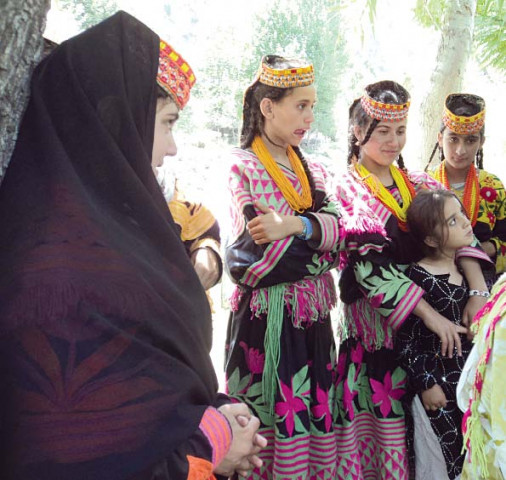Ignoring traditions: Modernisation threatening unique Kalasha culture
The 3,500-year-old culture might be lost if efforts are not taken to preserve it.

The rich cultural heritage of Kalash tribes, who have been living in Chitral for hundreds of years, is losing its unique customs and traditions due to increasing modernism in the region.
“Kalash has a 3,500 year long history. The people of Kalash are known as the indigenous people of Chitral who once ruled the entire valley, before the Raees from China and Turkistan snatched their rule from them,” said Inayatullah Aseer, a social worker from Ayun. After that, the Kalash people moved towards Birir, Rumbur and Bumburet Valleys in the Hindu Kush Mountains, he added.
Even though the Kalasha are a minority in the region, there has never been any conflict between them and the Muslims. They have been celebrating their festivals with complete freedom and have been living with peace and humanity.
He explained that the people of Kalash have a firm belief in God, but they don’t believe in prophets. “They are the most peaceful people in the world,” he remarked. “They don’t even marry with their close relatives, and the dead are buried above ground in ornamented wooden coffins. They spend their entire savings on the ceremonials of the dead, as they do not believe in being gloomy over the death of a person. All the communities are invited to attend the ritual,” he explained.
He added that the Kalash people believe in giving complete freedom to women and are treated equally by the male community. “The women are free to choose their husbands, and they are engaged in all sorts of outdoor activities including farming.”
However, the ancient culture and traditions of Kalash is fading with the passage of time. “The Kalash community, especially the younger generation, no longer values its culture and religion, said Aseer.”Children have stopped wearing their traditional dress, and one cannot differentiate between a Kalash boy and a Muslim boy,” he said, adding that women have also started to challenge their traditional dress.
“The elders should come forward and strive to preserve the traditions, rituals and customs of Kalash, which are known all over the world,” he said.
Talking about the values and traditions, Sharakat Karim, a young Kalash boy said, “We do wear our traditional dress, but only during festivals. There is no need to wear it on normal days.”
However, a glimpse of hope is still present, as certain members of the society are actively involved in the preservation of their customs and values.
Lakshan Bibi, who is the first female pilot hailing from Chitral, is one such woman who is struggling to restore the culture of Kalash. She has written several books that highlight the traditions of Kalash, and has also been working with the education department to include her writings in primary school syllabus. She believes the unique and ancient culture of Kalasha might be lost forever if efforts are not taken to preserve it.
Published in The Express Tribune, July 18th, 2011.



















COMMENTS
Comments are moderated and generally will be posted if they are on-topic and not abusive.
For more information, please see our Comments FAQ